Anshul Jindal
FedLesScan: Mitigating Stragglers in Serverless Federated Learning
Nov 10, 2022Abstract:Federated Learning (FL) is a machine learning paradigm that enables the training of a shared global model across distributed clients while keeping the training data local. While most prior work on designing systems for FL has focused on using stateful always running components, recent work has shown that components in an FL system can greatly benefit from the usage of serverless computing and Function-as-a-Service technologies. To this end, distributed training of models with severless FL systems can be more resource-efficient and cheaper than conventional FL systems. However, serverless FL systems still suffer from the presence of stragglers, i.e., slow clients due to their resource and statistical heterogeneity. While several strategies have been proposed for mitigating stragglers in FL, most methodologies do not account for the particular characteristics of serverless environments, i.e., cold-starts, performance variations, and the ephemeral stateless nature of the function instances. Towards this, we propose FedLesScan, a novel clustering-based semi-asynchronous training strategy, specifically tailored for serverless FL. FedLesScan dynamically adapts to the behaviour of clients and minimizes the effect of stragglers on the overall system. We implement our strategy by extending an open-source serverless FL system called FedLess. Moreover, we comprehensively evaluate our strategy using the 2nd generation Google Cloud Functions with four datasets and varying percentages of stragglers. Results from our experiments show that compared to other approaches FedLesScan reduces training time and cost by an average of 8% and 20% respectively while utilizing clients better with an average increase in the effective update ratio of 17.75%.
IAD: Indirect Anomalous VMMs Detection in the Cloud-based Environment
Nov 22, 2021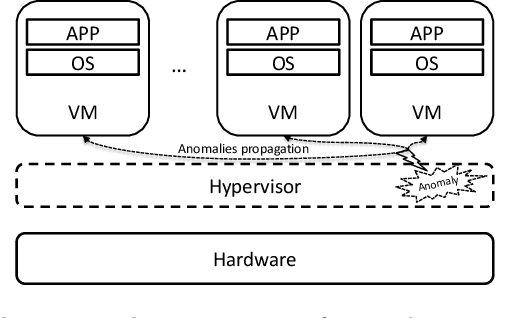
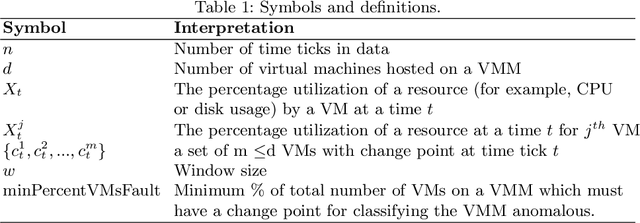
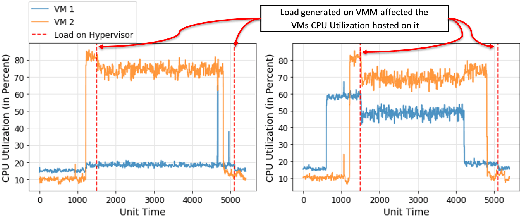
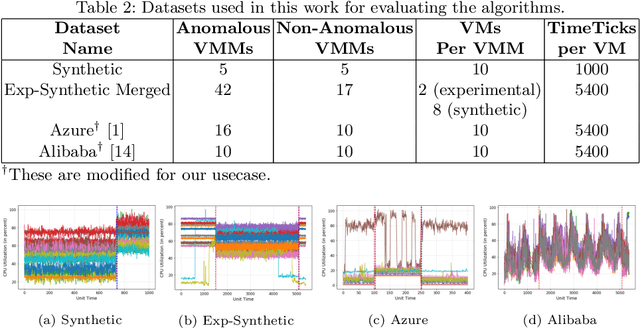
Abstract:Server virtualization in the form of virtual machines (VMs) with the use of a hypervisor or a Virtual Machine Monitor (VMM) is an essential part of cloud computing technology to provide infrastructure-as-a-service (IaaS). A fault or an anomaly in the VMM can propagate to the VMs hosted on it and ultimately affect the availability and reliability of the applications running on those VMs. Therefore, identifying and eventually resolving it quickly is highly important. However, anomalous VMM detection is a challenge in the cloud environment since the user does not have access to the VMM. This paper addresses this challenge of anomalous VMM detection in the cloud-based environment without having any knowledge or data from VMM by introducing a novel machine learning-based algorithm called IAD: Indirect Anomalous VMMs Detection. This algorithm solely uses the VM's resources utilization data hosted on those VMMs for the anomalous VMMs detection. The developed algorithm's accuracy was tested on four datasets comprising the synthetic and real and compared against four other popular algorithms, which can also be used to the described problem. It was found that the proposed IAD algorithm has an average F1-score of 83.7% averaged across four datasets, and also outperforms other algorithms by an average F1-score of 11\%.
FedLess: Secure and Scalable Federated Learning Using Serverless Computing
Nov 05, 2021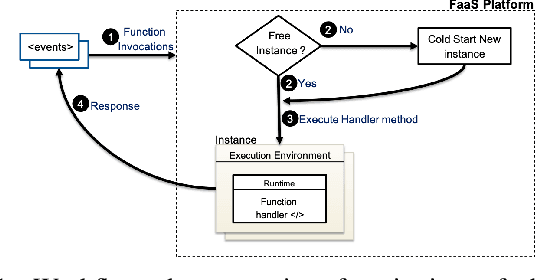
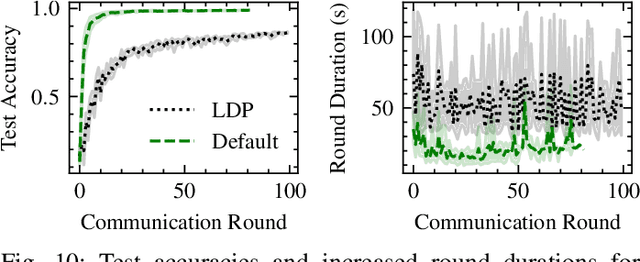
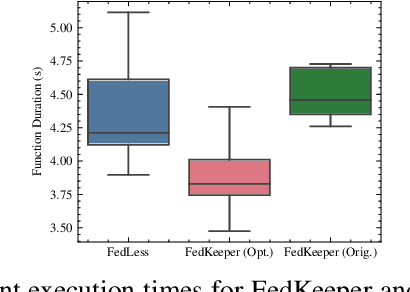
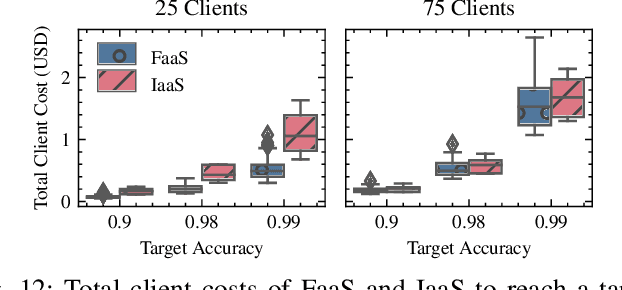
Abstract:The traditional cloud-centric approach for Deep Learning (DL) requires training data to be collected and processed at a central server which is often challenging in privacy-sensitive domains like healthcare. Towards this, a new learning paradigm called Federated Learning (FL) has been proposed that brings the potential of DL to these domains while addressing privacy and data ownership issues. FL enables remote clients to learn a shared ML model while keeping the data local. However, conventional FL systems face several challenges such as scalability, complex infrastructure management, and wasted compute and incurred costs due to idle clients. These challenges of FL systems closely align with the core problems that serverless computing and Function-as-a-Service (FaaS) platforms aim to solve. These include rapid scalability, no infrastructure management, automatic scaling to zero for idle clients, and a pay-per-use billing model. To this end, we present a novel system and framework for serverless FL, called FedLess. Our system supports multiple commercial and self-hosted FaaS providers and can be deployed in the cloud, on-premise in institutional data centers, and on edge devices. To the best of our knowledge, we are the first to enable FL across a large fabric of heterogeneous FaaS providers while providing important features like security and Differential Privacy. We demonstrate with comprehensive experiments that the successful training of DNNs for different tasks across up to 200 client functions and more is easily possible using our system. Furthermore, we demonstrate the practical viability of our methodology by comparing it against a traditional FL system and show that it can be cheaper and more resource-efficient.
DeepEdgeBench: Benchmarking Deep Neural Networks on Edge Devices
Aug 21, 2021
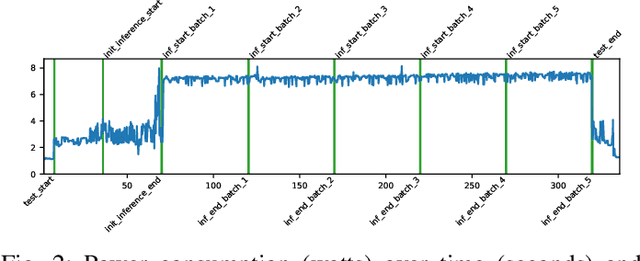


Abstract:EdgeAI (Edge computing based Artificial Intelligence) has been most actively researched for the last few years to handle variety of massively distributed AI applications to meet up the strict latency requirements. Meanwhile, many companies have released edge devices with smaller form factors (low power consumption and limited resources) like the popular Raspberry Pi and Nvidia's Jetson Nano for acting as compute nodes at the edge computing environments. Although the edge devices are limited in terms of computing power and hardware resources, they are powered by accelerators to enhance their performance behavior. Therefore, it is interesting to see how AI-based Deep Neural Networks perform on such devices with limited resources. In this work, we present and compare the performance in terms of inference time and power consumption of the four Systems on a Chip (SoCs): Asus Tinker Edge R, Raspberry Pi 4, Google Coral Dev Board, Nvidia Jetson Nano, and one microcontroller: Arduino Nano 33 BLE, on different deep learning models and frameworks. We also provide a method for measuring power consumption, inference time and accuracy for the devices, which can be easily extended to other devices. Our results showcase that, for Tensorflow based quantized model, the Google Coral Dev Board delivers the best performance, both for inference time and power consumption. For a low fraction of inference computation time, i.e. less than 29.3% of the time for MobileNetV2, the Jetson Nano performs faster than the other devices.
Online Memory Leak Detection in the Cloud-based Infrastructures
Jan 24, 2021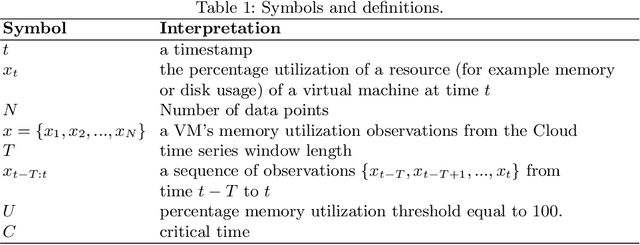
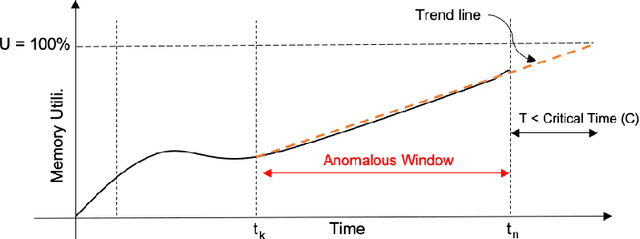
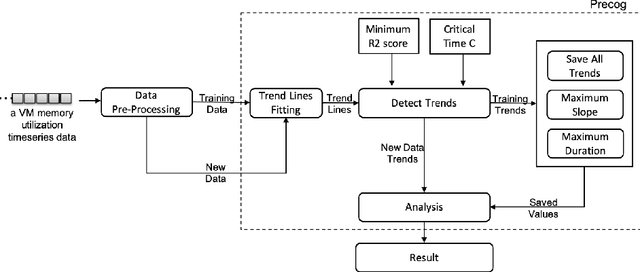
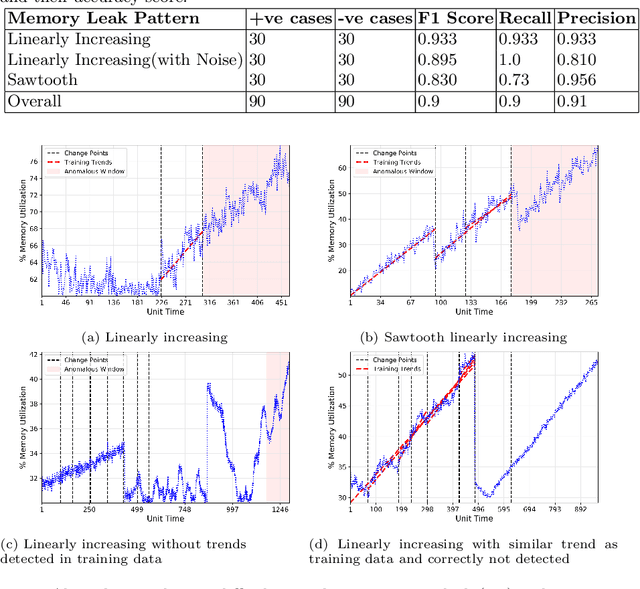
Abstract:A memory leak in an application deployed on the cloud can affect the availability and reliability of the application. Therefore, to identify and ultimately resolve it quickly is highly important. However, in the production environment running on the cloud, memory leak detection is a challenge without the knowledge of the application or its internal object allocation details. This paper addresses this challenge of online detection of memory leaks in cloud-based infrastructure without having any internal application knowledge by introducing a novel machine learning based algorithm Precog. This algorithm solely uses one metric i.e the system's memory utilization on which the application is deployed for the detection of a memory leak. The developed algorithm's accuracy was tested on 60 virtual machines manually labeled memory utilization data provided by our industry partner Huawei Munich Research Center and it was found that the proposed algorithm achieves the accuracy score of 85\% with less than half a second prediction time per virtual machine.
* 12 pages
 Add to Chrome
Add to Chrome Add to Firefox
Add to Firefox Add to Edge
Add to Edge